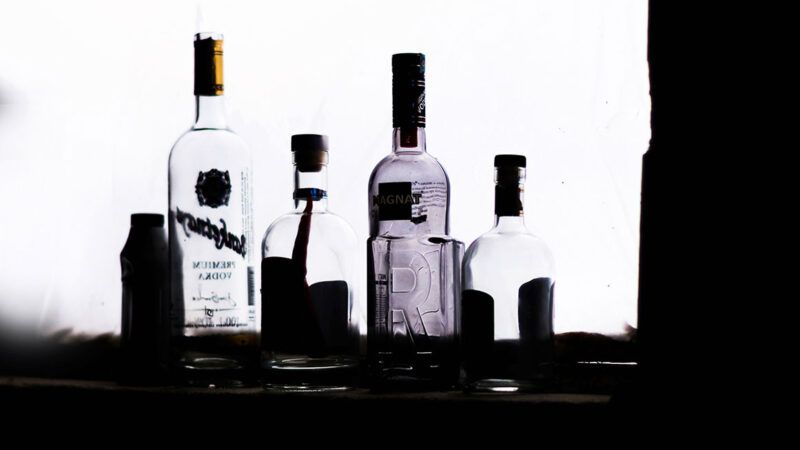Liquor Regulators Are Seeking Revenge on Bars That Broke Pandemic Rules
"The people who violated the governor's mandates and orders should face some consequences," a Pennsylvania Liquor Control Board member said in 2022.

During the height of the pandemic summer of 2020, the proprietors of the Burning Bridge Tavern worked with local officials in Wrightsville, Pennsylvania, to host a series of outdoor gatherings for the community.
For their trouble, the bar's owners got slapped with a series of citations by the Pennsylvania Liquor Control Board (PLCB), the government agency that oversees and manages the sale of alcohol in the state. The citations were ticky-tack offenses, according to Burning Bridge's chief financial officer, Mike Butler. Twice, the bar was cited for noise violations because they'd allowed a band playing at the gathering to plug into the tavern's electricity supply. Another offense occurred when the owners and some family members were drinking inside the tavern, which was closed to the public, during a period when indoor dining was prohibited.
A frustrating situation, but not the end of the world. Burning Bridge's owners paid the fines associated with the citations and assumed that was that. But then the bar had to renew its liquor license.
"They denied it. They said, 'Oh, you're the guys that got all those citations,'" Butler says. "It was a real gut punch."
Turns out, over the past two years the PLCB has pushed dozens of Pennsylvania establishments that racked up pandemic-related citations to sign "conditional licensing agreements" to renew their liquor permits. In some cases, those agreements have forced the sale of licenses—but in most cases, as with Burning Bridge, they've added additional conditions to the license that could prevent a future renewal from being approved.
While the PLCB cannot revoke existing licenses, the board is empowered to object to the renewal of a license or to demand the license can only be renewed conditionally. "In extreme cases," PLCB Press Secretary Shawn Kelly says, the PLCB can force the sale of a liquor license, though the board only pursues that option when "there is an operational and citation history that calls for such an agreement."
Even though Burning Bridge's owners weren't forced to sell their license, Butler says signing the conditional licensing agreement has come with real costs: The bar's insurance premium tripled as a result of being viewed as a greater risk.
Typically, those agreements have been used to curb nuisance bars or force establishments with a history of legal problems, like serving underage patrons, to clean up their acts. Recently, however, the PLCB has taken a hardline stance against establishments that violated pandemic-era rules.
"The people who violated the governor's mandates and orders should face some consequences," argued Mary Isenhour, one of the PLCB's three board members, at a January 2022 meeting where the first several of the COVID-related conditional licensing agreements were approved.
Isenhour was responding to an objection raised by a fellow board member, Michael Negra, who argued that the PLCB should take the view that businesses had "paid their dues" during the pandemic and should not face additional sanction now. Negra left the PLCB in June 2022 and now works for a Pittsburgh-based lobbying firm. He did not return requests for comment.
After Negra's departure, the PLCB has unanimously approved dozens of conditional licensing agreements for COVID-related violations, including at least 10 that have required the sale of a license, based on a review of PLCB meeting minutes.
Kelly, the PLCB spokesman, maintains that licensees are "under no obligation" to sign conditional licensing agreements.
But any licensee that refuses would face a set of unattractive alternatives: not having the license renewed, or being drawn into a legal battle against the PLCB in state court.
"Do you risk your entire business, your license, the loans, all of that to fight" in a real court, asks Butler. "Or do you just kind of hold your nose and take your medicine? Tactically, for us, we weren't in a position to say, 'Yeah, we'll run that risk.'"
Chuck Moran, executive director of the Pennsylvania Licensed Beverage and Tavern Association, acknowledges that pandemic-era public health orders left many establishments with a difficult choice between following the law and surviving financially. Fairly or unfairly, "those who broke the rules went the wrong way and now they're paying the price," he says.
The whole matter raises some complicated questions about how our political institutions ought to handle, with the benefit of hindsight, the unprecedented circumstances created by the pandemic and policy makers' response to it.
"The feeling was that our government really isn't working to try and help us," says Butler. "At this point, it feels like they're coming after us."


Show Comments (27)